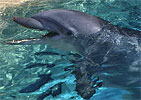 | Newborn Dolphins and Orcas Don't Sleep Their Mothers Don't Sleep Much Either |  |
 | Newborn Dolphins and Orcas Don't Sleep Their Mothers Don't Sleep Much Either |  |
 July 3, 2005
July 3, 2005Mothers of newborn babies often complain that they don't get enough sleep. Human babies may sleep for up to 16 hours each day, but most babies sleep for only short periods at one time. Mothers must feed the baby and change the baby's diapers frequently -- sometimes several times during the night. Because the schedules of the baby and mother do not match, the mother may end up deprived of sleep.
At least human mothers get some sleep. The mothers of newborn
dolphins and orcas (also called "killer whales") get almost
NO sleep for several weeks after their calves are born.
The calves themselves don't sleep at all! Researchers in the United States and Russia studied two captive killer whale (Orcinus orca) mothers and their calves and four captive dolphin (Tursiops truncatus) mothers and their calves. The scientists recorded how much time the animals spent floating on the surface of the water or lying on the bottom of their pools. These behaviors were considered to be periods of sleep. Usually, adult orcas spend between five and eight hours sleeping each day.
The behavior of the newborn killer whales and dolphins was much different
than that of adult animals. The killer whale and dolphin calves showed no
sleep behavior for three weeks after they were born.
As the calves got Could the animals have slept while they were swimming? The researchers point out that dolphins and beluga whales have been observed to sleep with one brain hemisphere at a time. During these periods of sleep, the eye on the opposite side of the sleeping hemisphere is almost always closed. This eye closing behavior was almost never seen in newborn dolphin and killer whale calves or their mothers for the first few weeks after the calves were born. The frequent turning and surfacing behavior of the calves also make it less likely that they got any sleep. The lack of sleep in these dolphins and killer whales is very unusual. This behavior has not been seen in any other animals. The scientists believe that the ability to go without sleep may help the calves avoid predators and maintain their body temperature until they develop enough blubber to survive in cold water. |
|
Did you know?
|
|
|
Reference and more information:
|
| GO TO: | Neuroscience In The News | Explore the Nervous System | Table of Contents |
![[email]](./gif/menue.gif) Send E-mail |
 Get Newsletter |
 Search Pages |